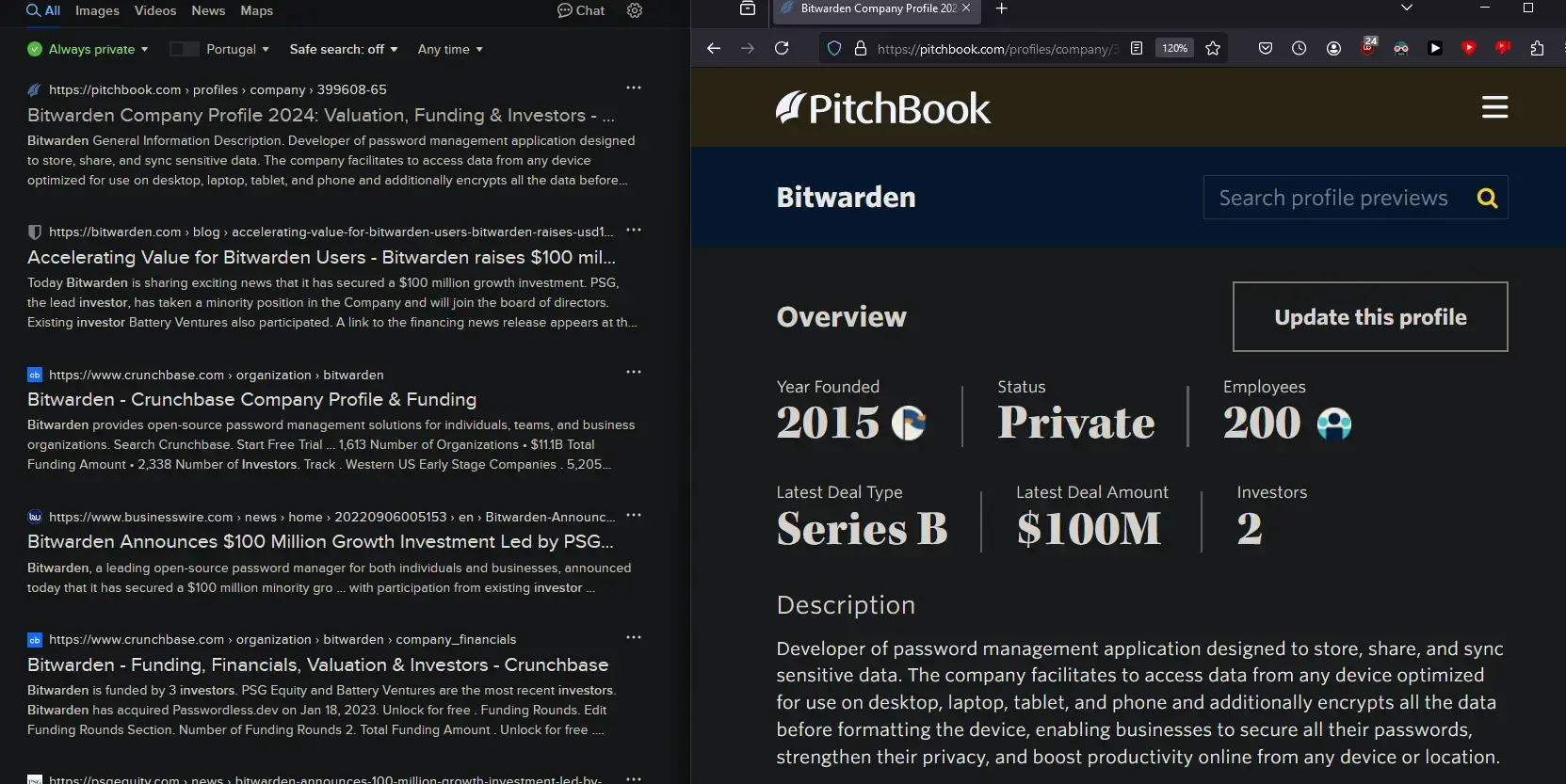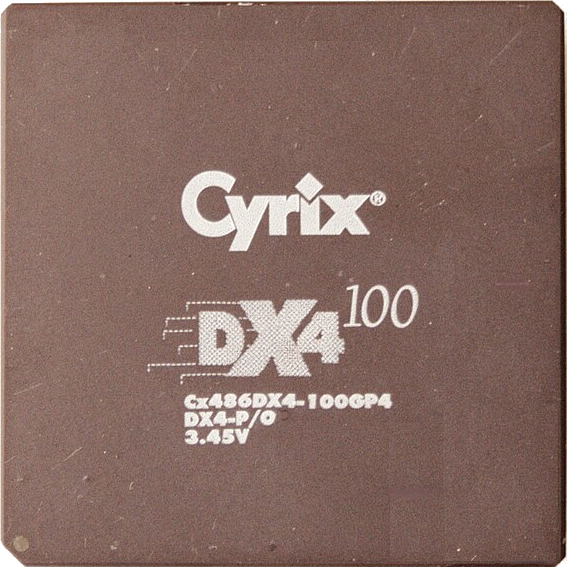- cross-posted to:
- selfhosted@lemmy.world
- cross-posted to:
- selfhosted@lemmy.world
Keepass vault synced over syncthing.
I keep not regretting it.
Was going to be my solution as well, bjt Syncthing-Android just got discontinued.
What? I need syncthing-android, where is it going?
F-Droid syncthing-fork is still actively developed and had a patch in the last few weeks.
Good to know
F-Droid syncthing-fork is still actively developed and had a patch in the last few weeks.
So hopefully this isn’t the end.
I’ve always loved Keepass, however I moved away from it in 2012 as it and any file based vault has brute forcing issues. You need to track every copy of it that has been made and if any copy falls out of your hands, like if you lose a device, you need to do a password rotation on 100% of your passwords. Since its a file, its not possible to prevent brute forcing.
everything’s a file
This is incredible

Right next to each other lol
Syncthing fork seems to still be under active development
deleted by creator
Thats not good :(

oh thank god
The community’s reaction is a but funny if this was a honest mistake
I wonder~ I wonder~ I wonder whyyyy…

I don’t understand.
Are you saying it’s a bait and switch like Google, where they suck people in with a good product then enshittify it once they’re hooked?
I’m not thoroughly aware of their dealings, but these amounts of private investment aren’t going to pay for themselves. If you raise 100 million, investors typically want a billion back, or more.
From the looks of it, Bitwarden might’ve tried to go with the Open Source model to get free development resources, trust (because it’s an open source PASSWORD manager), and general goodwill. But now that they’ve deemed that got enough of a market share (or investors are starting to breathe down their necks), it’s time to start raising the walled garden.
Even if they claim after the fact that it was a “Bug” that the client couldn’t be built without their proprietary sdk. The very fact one exists is a bad enough sign, specially when its influence is spreading.
VC is a devil’s bargain. Raising VC money is NEVER a good sign.
Keepass. Keep it simple.
3rd party sync of the database can have a lot of problems
If you want to roll your own with keepass that’s fine, but most people will want a more comprehensive solution.
I switched from keepass to Bitwarden because individual entries started randomly disappearing. I’m still discovering missing accounts after switching a couple of weeks ago. Sometime to do with how keepass was opening the files, because when an entry went missing it was gone even from backup files I hadn’t touched since before the entry disappeared.
Sound like something you did with replacing files. Bitwarden is dead simple, and that’s why it’s great.
so what’s the best pw manager?
Honestly, it’s Bitwarden right now. This move signals their intent to change that, though.
so the “no longer open source” means they’ll be moving to a saas model or something? i’m not super cybersecurity savvy but bitwarden is what i use
It means we have less insight on what they are doing with our passwords.
It doesn’t mean that in this case, except perhaps very indirectly.
great…
No, technically they already are SaaS company. That’s mostly how they make their money.
Also it should be noted “no longer open source” doesn’t mean they’ve done a “our code is now closed and all your passwords are ours” rug pull like some other corporations. This is a technical concern with the license and it no longer meets proper FOSS standards (in other words, it has a restriction on it now that you wouldn’t see in, for example, the GPL).
So by and large the change is very minimal, the code is still available, it’s still the best option. However, this does matter. It may be a sign of the company changing directions. It’s something they should get pushback about.
From the update, it looks like they consider it a bug, which they’re working to resolve. Let’s see how they resolve it before jumping to conclusions.
The SDK was never FOSS, and was never under the GPL. Hence why they can add the text mentioned in the article. You don’t get to change the text of a FOSS license to begin with. It isn’t unheard of for text like this to be part of proprietary software that integrates with and uses FOSS that are under different licenses.
That said, this is concerning, but whether it changes BW’s FOSS state is a matter of legal bickering that has been going on for decades.
You can’t retroactively change FOSS licensing, but oft times you can alter the licensing moving forward. Not always the case, of course. But in no way are all FOSS licenses set in stone.
Proton Pass is open source and the company that runs it recently reincorporated as a Swiss non-profit to ensure their privacy mission can’t be bought out by venture capitalists etc.
Vaultwarden is a nice self hosted bitwarden alternative
https://github.com/dani-garcia/vaultwardenSome prefer using KeepassXC and sync the database between devices
https://www.ctrl.blog/entry/keepass-vs-bitwarden-server.html+1 For KeePassXC and the KeePass ecosystem. Yes, you need to sync the database yourself, but you can use any file sharing service you like, e.g. google drive, dropbox… or selfhost something like nextcloud (like I do), which for me is actually a point in its favor.
Based on this news, I think I made the right choice back then when I decided to go with KeePass.
As someone who used to use KeePass, went to LastPass, and then Bitwarden (Vaultwarden), I finally got my non-tech literate wife to use Bitwarden. I’m concerned that KeePass might end up being more difficult if it comes down to it. I believe that KeePass had some sort of browser integration but it really has been a long time since I used it so who knows the current state. Curious how browser integration is today.
The big issue isn’t using it, it’s syncing it.
User A used KeePass to order pizza and changed the Papa John’s(heaven forbid) password while they were at it, on their desktop.
syncing: “oh! This file changed! Neat!”
User B picks up their phone and wants to order Papa John’s at work. They try, but the password isn’t right. Huh. They check KeePass. No issues. They go to change the password because they think something is wrong.
(All the while, they never thought to see if syncthing had been woken up in the background lately)
They change the password, update KeePass,
syncthing opens later, goes: "Oh, hi, User B’s phone! I have a ne- Oh! You have a new password file too!!? Small world! I’ll take both!
Now there’s two files, two users who think they both made corrections to a password, syncthing thinking nothing is wrong, and someone has to now merge the newer KeePass file over the old ones by hand and realize what happened, but the bigger problem is, no one knows anything is wrong yet and it doesn’t even take two users. This can just be you ordering on your phone after modifying on your desktop.
well, it’s just pizza.
As an example. Imagine an insurance app, or a banking app, or the DMV… And you won’t know for months down the line. It gets old.
Ah yeah, the fun of how that works. I recall that I had previously set up WebDAV to try to simplify my source of truth but I think that was just with the original KeePass app, not KeePassXC. I also wasn’t trying to share passwords among multiple people but I do recall having issues when I was using Dropbox to sync to my phone since I would have to actually make sure Dropbox had updated the copy of the file which required me opening the app at the time.
I use KeePassXC’s browser integration daily and it works pretty well with Firefox (linux), well enough that I’m not complaining, but I cannot compare it with Bitwarden cause I never used it. On Android I use Keepass2Android and works well with autofill, but again, I can’t really compare it.
Something tells me Bitwarden works better, just by virtue of being a commercially supported product, but I have no complaints with KeePassXC & Keepass2Android (KeePassDX works well on android too). Original KeePass desktop client was never great though.
Vaultwarden is Bitwarden–at least for now, this change may push them apart.
Keepass? No cross device support, you need to manage that yourself through something like Google Drive…
Agh, gross.
lol that’s what i used before i switched to bitwarden-- didn’t have any complaints, but the database key file thing was kind of a pain
What do you mean “no cross device support”? KeePassXC supports Win, Mac, Linux and there are iOS and Android apps available…
As for the lack of cloud and requirement to provide your own synchronization, for some (like me) that’s a feature, not a limitation :)
Do any of the iOS or Android apps support passkeys? I looked into this a couple days ago and didn’t find any that did. (KeePassXC does.)
From a quick search, Keepass2Android doesn’t have it, not clear if they’re working on it: https://github.com/PhilippC/keepass2android/issues/2099
KeePassDX similarly has an open issue, not clear when/if it will be implemented: https://github.com/Kunzisoft/KeePassDX/issues/1421
Good to know about Strongbox on iOS, though I’m on android so no bueno for me.
Keepass2Android doesn’t have it yet, but seems to be working on it
https://github.com/PhilippC/keepass2android/issues/2099Strongbox seem to have their implementation done for iPhone
https://strongboxsafe.com/updates/passkeys/I don’t use passkeys so I don’t know. Maybe I should research into passkeys, what’s the benefit over plain old (long, randomly generated) passwords?
Ok, from a quick search, it seems passkeys rely on some trusted entity (your browser, OS, …) to authenticate you, so, yeah, I’m not sure if I like that. The FIDO alliance website is all about how easy, convenient and secure passkeys are, and nothing about how they actually work under the hood, which is another red flag for me.
I’ll stick to old-fashioned, long, secure, randomly generated passwords, thanks.
Passkeys rely on you holding a private key. The initial design was that a device (like a browser or computer/phone) stored the private key in a TPM-protected manner, but you can also store it in a password manager.
This is more secure than a password because of the way private/public key encryption works. Your device receives a challenge encrypted with the public key, decrypts with the private key and then responds. The private key is never revealed, so if attackers get the public key they can’t do shit with it.
Just be sure that your private key is safe (use a strong master password for your PM vault) and your passkey can’t be stolen by hacking of a website.
I see, that makes sense and should be more secure, in theory. Thanks for the explanation.
The issue I have is, whether I need to trust a third party with my private key, e.g. Google with Android, Microsoft with Windows, etc. (yes on linux it’s different, but that’s not my only OS).
Also if the private key does get compromised (e.g. local malware steals it), hopefully there’s an easy way to revoke it.
I’m no expert in this but the passkeys really on some sort of public key, cryptographic pair. Your device will only send your encrypted cryptographic secret when it gets the correct encrypted cryptographic secret from the destination. This makes it much harder to steal credentials with a fake website or other service.
Goddammit. It’s getting to the point I’m going to have to figure out how to write my own app for this.
It shouldn’t even be that complex…
I might be mistaken, but ultimately a password manager is basically nothing more than a database of passwords in an encrypted zip file. That could entirely be self-hosted with off the shelf open source applications stringed together.
All you’d need is a nice UI stringing it all together.That is the bare minimum of a password manager like Bitwarden.
I’ve done basically this in the past by encrypting a text file with GPG. But a real password manager will integrate with your browser and helps prevent getting phished by verifying the domain before entering a password. It also syncs across all my devices, which my GPG file only worked well on my desktop.
Yup, thanks. Was thinking along these same lines.
It’s the “stringing it all together” that could be problematic.
If you have multiple clients (desktop/cellphone) modifying the same entry (or even different entries in the same “database” ). You need something smart enough to gracefully handle this or atleast tell you about it.
I did the whole “syncing” KeePass and it was functional, but it also meant I needed to handle conflicts - which was annoying. I switched and really appreciate the whole “it just works” with self-hosted bitwarden.
I see it as it’s easy to self host. But I’m not skilled nor rich enough to guarantee the availability of it. I don’t want to be stuck on a holiday without my passwords because my server back home died from black out or what have you.
I pay for bitwarden and the proton mail package to keep the password management market a bit more competitive and it actually works out cheaper. It would be nice to have protons anonymous emails built in, but I can live with it.
But I might have to reconsider if Bitwarden is going a different direction that what I’m paying for.
Keepass is exactly that. Basically all the client side parts, and the database is a single encrypted file that you can sync however you want.

Thank you for the update! I would like to keep using it. I’ve been very happy with Bitwarden both as a password manager and a TOTP authenticator. I have even recommended it to my boss as an enterprise solution for us to use at work, and so far we are planning on replacing our current password database solution with Bitwarden.
Unfortunately, with “enshittification” being so common these days, it was very easy to believe they were also going to the dark side. I will remain cautiously optimistic after learning it was a packaging bug.
Here’s a link to the post on X (yes, I hate X, too) in case anyone else is doubtful:
Yeah, I was worried about it too. I’ve become pretty cynical when it comes to everything becoming enshittified, but I’m hoping they stick to their word.
Oh, for fuck’s sake. Can we have a decent password manager that isn’t tied to a browser or company? I pay for Bitwarden. I’m not being cheap. But open source is more secure. We can look at the code ourselves if there’s a concern.
Its called Keepass. You are welcome
Nothing in the article or in the Bitwarden repo suggests that it’s moving away from open source
It is a license problem. The license condition of the SDK which is required to build the client app change to limit the usage of it. The new license states that you can only use the Bitwarden SDK for Bitwarden. It is against the Freedoom-0 of the Free Software Foundation. The limitation of English language is that it is hard to differentiate between Free (as in Free bear) and Free (as in Freedoom). Also open source which could mean complaining with FOSS and that source is available. This been unfortunately have been abused before.
From the article, it’s a packaging bug, not a change in direction.
Update: Bitwarden posted to X this evening to reaffirm that it’s a “packaging bug” and that “Bitwarden remains committed to the open source licensing model.”
I was referring to this which started it all.
Here is the code in question. Basically, it’s a source-available, but not FOSS internal SDK, with the following language:
The password manager SDK is not intended for public use and is not supported by Bitwarden at this stage. It is solely intended to centralize the business logic and to provide a single source of truth for the internal applications. As the SDK evolves into a more stable and feature complete state we will re-evaluate the possibility of publishing stable bindings for the public. The password manager interface is unstable and will change without warning.
So I think the “bug” here is in not linking the original repo in the NPM package, and there’s a decent chance that this internal SDK will become FOSS in the future once it stabilizes. That said, it’s currently not FOSS, but it’s too early IMO to determine whether Bitwarden is moving in a non-FOSS direction, or if they’re just trying to keep things simple while they do some heavy refactoring to remove redundancy across apps.
Given their past, I’m willing to give them the benefit of the doubt, but I’ll be making sure I have regular backups in case things change.
Notepad.exe
Its open source now right?
They have confirmed it was a packaging bug and will be resolved.
Pass.
Keepass: Am I a joke to you?
Love Keepass. Love that I can sync it however I want. Love that there are multiple open source client options across several operating systems.
Android syncthing announced they’re stopping development this year. Open source got fucked double today
deleted by creator
Keepassxc? Vaultwarden?
Isn’t Vaultwarden used with non-free Bitwarden clients?
The clients are free.
They now require a non-free Bitwarden SDK component. That’s what this whole conversation is about.
And the whole conversation is about a bug, not a change in direction…
Update: Bitwarden posted to X this evening to reaffirm that it’s a “packaging bug” and that “Bitwarden remains committed to the open source licensing model.”
Could you ELI5 please?
“You may not use this SDK to develop applications for use with software other than Bitwarden (including non-compatible implementations of Bitwarden) or to develop another SDK.”
This is a condition when using their SDK. This is not considered a free (as in freedom) component because it violates freedom 0: https://www.gnu.org/philosophy/free-sw.en.html#four-freedoms
Only the desktop client. And the response is that not being able to compile sans SDK is an issue they will resolve.
I still think this is bad directionally, but we need to see what happens.
This need not be the case, though! There’s an open source client on Android called Keyguard. I don’t think the desktop app was at all useful anyway. You can just log into your Vaultwarden through any browser. The desktop app is pointless.
True, but the firefox extension is nice.
Keyguard isn’t open source. Have a look at their license. It just says “All rights reserved”.
Well this ain’t good. I don’t really feel like switching apps.
That’s how they get you. Jump ship now
Anyone looking at this…what alternatives are out there?
Update: Bitwarden posted to X this evening to reaffirm that it’s a “packaging bug” and that “Bitwarden remains committed to the open source licensing model.”
I’m not going to jump ship just yet, though I may get around to updating my backup.
There are plenty of alternatives, so feel free to shop around. But don’t jump the gun just because of a random Phoronix article with an update that says basically the opposite of what the article claims. Wait some time to see if there are actual changes coming.
Yeah no. This is clearly backpedaling and you should look to get away
Maybe. Here’s what they say in the readme of the project people are complaining about:
The password manager SDK is not intended for public use and is not supported by Bitwarden at this stage. It is solely intended to centralize the business logic and to provide a single source of truth for the internal applications. As the SDK evolves into a more stable and feature complete state we will re-evaluate the possibility of publishing stable bindings for the public. The password manager interface is unstable and will change without warning.
There are two ways to take this:
- this is temporary as they’re refactoring code to reduce duplication across clients
- refactoring is an excuse to create fully proprietary clients going forward
Until I see evidence of the latter, I’ll stick with the project, but I’ll be more consistent about creating backups so I can switch easily if I need to.
KeePassxc with syncthing
Nextcloud with their password solutions
A notebook
Sooo, where’s ProtonPass at? They’re open source and non-profit, right?
The server is not open source and I wouldn’t trust a business that is not just working on password managers.
and I wouldn’t trust a business that is not just working on password managers.
Because…? They’re a privacy tool oriented company, no?
Because they aren’t focused on just one single service. Bitwarden is a single business only focusing on their password manager, whereas proton has a suite of tools. Passwords need to be stored absolutely in a robust and safe way. I don’t trust proton with anything at all, and the proton pass is no exception. The client might be open source, but the backend is not. It’s also not as mature as bitwarden.
These are valid points. There are many password managers, most of which it wouldn’t take much to poke holes in, especially if open source is a main criteria.
What are some that you would consider with Bitwarden now being off the table?
Its worth noting I don’t think they’re actually a company anymore, I think they’re now a non-profit (I may be mistaken, but that’s my present understanding)
sigh
https://github.com/dani-garcia/vaultwarden Open source version of bitwarden written in rust.
Where is the foundation to support foss?!?
This is by no means to a slight towards bitwarden. Solid product and community
If they’re moving away from open source/more monetisation then they’re going to do one of two things.
1: Make the client incompatible (e.g you’ll need to get hold of and prevent updating of a current client).
2: DMCA the vaultwarden repoIf they’re going all-in on a cash grab, they’re not going to make it easy for you to get a free version.
You can’t “dmca” the fork that was created while it was still open source. They could only prevent it from getting future updates (directly from them).
If you mean they shouldn’t. I’d agree. But, as has been seen a lot on youtube. “They” can DMCA anything they want, and the only route out is usually to take them to court.
I mean I’d hope if they’re going in this direction they will be decent about it. But, it’s not the way things seem to be lately.
DMCA is a tool for suppression of free information. It doesn’t require evidence that you’ve made a good faith effort to consider fair use or other legal complexity as it’s meant to take down the information before that is settled in court, but most commonly used to suppress information from a person or group who can’t afford to fight it in court. Microsoft’s Github has a history of delete first without risking their own necks to stand up for obviously fraudulent takedowns much less ones with unsettled law like APIs/SDKs.
Don’t forget option 3: someone writes a vaultwarden client independent of the closed-source crap.
If you can write a server that fully supports the client via the documented API, then you know everything you’d need to do to make a client as well.
That’s not a third option in the same list (things they are going to do), it’s an item in an entirely different list (foss responses to their actions).
You have your link formatted backwards. It should be Vaultwarden, with the link in the parentheses.
Update: Bitwarden posted to X this evening to reaffirm that it’s a “packaging bug” and that “Bitwarden remains committed to the open source licensing model.”
According to Bitwardens post here, this is a “packaging bug” and will be resolved.
Alright does anyone have opinions on Nextcloud Passwords? There’s apps for it and it would sync to my Nextcloud.
I hate this. Bitwarden has been a good app.
It’s a packaging bug, the headline is false.
Nextcloud passwords is just a client for a KeePass vault.
I guess it’s as good or bad as that can be, but I’m sure it’s limited in functionality to KeePassxc with plugins.
Are you sure?
Because last time I tried that it was THE worst password manager that i ever tried in my life. I’d feel safer with the ie6 password manager
Bitwarden has been a good app.
And it still is. There’s no reason to stop using Bitwarden, and I will continue my plans to switch to Vaultwarden.
As @Krzd@lemmy.world said, it’s a packaging bug, not an actual change in license. If you read the article, it says as much in the update.
Daniel García, owner of the Vaultwarden repo, has recently taken employment for Bitwarden.
The plot thickens.
Honestly, if he can replace the current Bitwarden BE w/ Vaultwarden, that would be awesome! The last time I looked at the Bitwarden self-hostable BE, it was super heavy, which is the entire reason I was interested in Vaultwarden.
I’m running a couple of Vaultwarden instances, and it would be really nice if Bitwarden employed Garcia to improve the Rust backend. But as the bitter cynic I am, I guess it is an effort to shut down and control as much of the open source use of Bitwarden as possible.
The worst case, someone will most likely fork Vaultwarden and we can still access it with Keyguard on mobile and the excellent Vaultwarden web interface :)
And I am an ardent optimist, hence why I see it as a good thing.
But yes, worst case someone will fork it, and I’ll probably use that fork.
Phew, looks good on the news with the packaging bug (if they didn’t just got cold feet for worse PR/backlash than they expected and this is a backtracking).
In this case, hopefully Garcia is employed for his expertise and can be deployed to further open source relations :)


























